

Speech Therapy Store is dedicated to making your speech therapy life easier one resource at a time. To do this, we often partner with companies that share that mission. If you sign up or make a purchase through one of our partners’ links, we may receive compensation—at no extra cost to you.
“I not know dat”. This is currently one of my 4-year-old twin boys favorite phrases when I teach him something new. I mean can we start with how stinking cute that sentence is?! But back to the point, grammar has a big impact on whether others understand what we are trying to say. That’s why I’ve gathered 21 grammar goals for speech therapy.
My hope is to make your life easier by providing a measurable goal list of good goals for any Speech-Language Pathologist to use and of course adapt to meet the needs of your individual child or students.
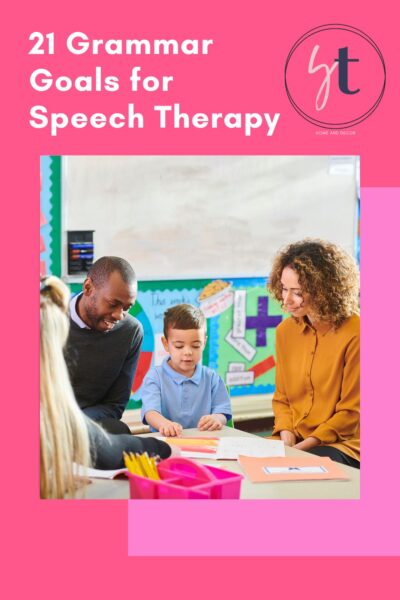
Given common objects, a picture, or story, STUDENT will say a complete sentence using articles (i.e., “a”, “an”, “the”, and “some”) with 80% accuracy in 4 out of 5 opportunities.
Given an object, picture, or story, STUDENT will say a complete sentence using demonstrative adjectives (i.e., “this”, “that”, “these”, and “those”) with 80% accuracy in 4 out of 5 opportunities.
Given an object, picture, or story, STUDENT will say a complete sentence using plural nouns (i.e., s, es, and irregular plural forms) with 80% accuracy in 4 out of 5 opportunities.
Given an object, picture, or story, STUDENT will say a complete sentence using possessive nouns (i.e., “the girl’s book”) with 80% accuracy in 4 out of 5 opportunities.
Given an object, picture, or story, STUDENT will say a complete sentence using subject pronouns (i.e., “I”, “he”, “she”, “you”, “we”, “they”) with 80% accuracy in 4 out of 5 opportunities.
Given an object, picture, or story, STUDENT will say a complete sentence using object pronouns (i.e., “me”, “him”, “her”, “you”, “us”, “them”) with 80% accuracy in 4 out of 5 opportunities.
Given an object, picture, or story, STUDENT will say a complete sentence using possessive pronouns (i.e., “my”, “mine”, “his”, “her/hers”, “you/yours”, “our/ours”, “their/theirs”) with 80% accuracy in 4 out of 5 opportunities.
Given an object, picture, or story, STUDENT will say a complete sentence using reflexive pronouns (i.e., “myself”, “himself”, “herself”, “yourself”, “yourselves”, “ourselves”, “themselves”) with 80% accuracy in 4 out of 5 opportunities.
Given an object, picture, or story, STUDENT will say a complete sentence using present progressive verb tense (i.e., “The girl is running”) with 80% accuracy in 4 out of 5 opportunities.
Given an object, picture, or story, STUDENT will say a complete sentence using past progressive verb tense (i.e., “The girl was running”) with 80% accuracy in 4 out of 5 opportunities.
Given an object, picture, or story, STUDENT will say a complete sentence using present tense “s” and “es” marker (i.e., “The girl runs”) with 80% accuracy in 4 out of 5 opportunities.
Given an object, picture, or story, STUDENT will say a complete sentence using “has”/”have” (i.e., “The girl has a book”) with 80% accuracy in 4 out of 5 opportunities.
Given an object, picture, or story, STUDENT will say a complete sentence using regular past tense (i.e., “The boy waited for the bus.”) with 80% accuracy in 4 out of 5 opportunities.
Given an object, picture, or story, STUDENT will say a complete sentence using irregular past tense (i.e., “ran”, “drove”, “drank”) with 80% accuracy in 4 out of 5 opportunities.
Given an object, picture, or story, STUDENT will say a complete sentence using conjunctions (i.e., “and”, “or”, “but”, “because”, “if”, “since”) with 80% accuracy in 4 out of 5 opportunities.
Given an object, picture, or story, STUDENT will say a complete sentence using future tenses (i.e., “The boy will go to school”) with 80% accuracy in 4 out of 5 opportunities.
Given an object, picture, or story, STUDENT will say a complete sentence using negative sentence structures (i.e., “will not/won’t”, “does not/doesn’t”) with 80% accuracy in 4 out of 5 opportunities.
Given an object, picture, or story, STUDENT will ask yes/no questions (i.e., “Is the boy hurt?”) in a complete sentence with 80% accuracy in 4 out of 5 opportunities.
Given an object, picture, or story, STUDENT will ask WH questions (i.e., “What is the girl doing?”) in a complete sentence with 80% accuracy in 4 out of 5 opportunities.
Given an object, picture, or story, STUDENT will say a complete sentence using comparatives (i.e., “The kitty is smaller than the tiger”) with 80% accuracy in 4 out of 5 opportunities.
Given an object, picture, or story, STUDENT will say a complete sentence using superlatives (i.e., “That is the best cookie.”) with 80% accuracy in 4 out of 5 opportunities.
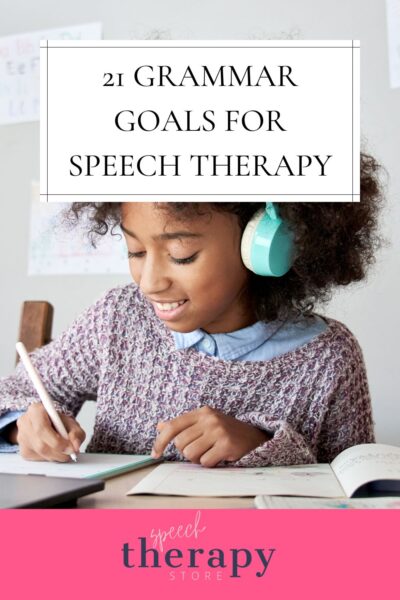
I know every district and even school setting has different ways it requires the goal writing of their objectives to be written, but typically my district wanted us to reduce either the number required or the percentage of achievement.
Here are a few examples to help get you started.
If we take a sample goal:
“Given an object, picture, or story, STUDENT will say a complete sentence using irregular past tense (i.e., “ran”, “drove”, “drank”) with 80% accuracy over 3 out of 4 consecutive sessions.”
(Meaning out of 4 therapy sessions in a row. They identified 3 possible solutions, the 3 consequences of those solutions and then determined the best solution in 2 out of 4 or 50% of the time in order to mark that goal mastered.)
As the Speech Language Pathologist you are the specialist and you know your students specific language impairments and child’s ability best though, so just take the smart goals from above and simplify them into achievable steps for your specific student.

If you’re a speech therapist or a classroom teacher in need of data tracking forms while working on your student’s grammar goals for speech therapy then the first place you might want to check out is my IEP goal data tracking for progress monitoring forms.
![]()
Or if you simply want a list of data sheets to choose from then be sure to check out my list of 35 free speech therapy data sheets roundup.
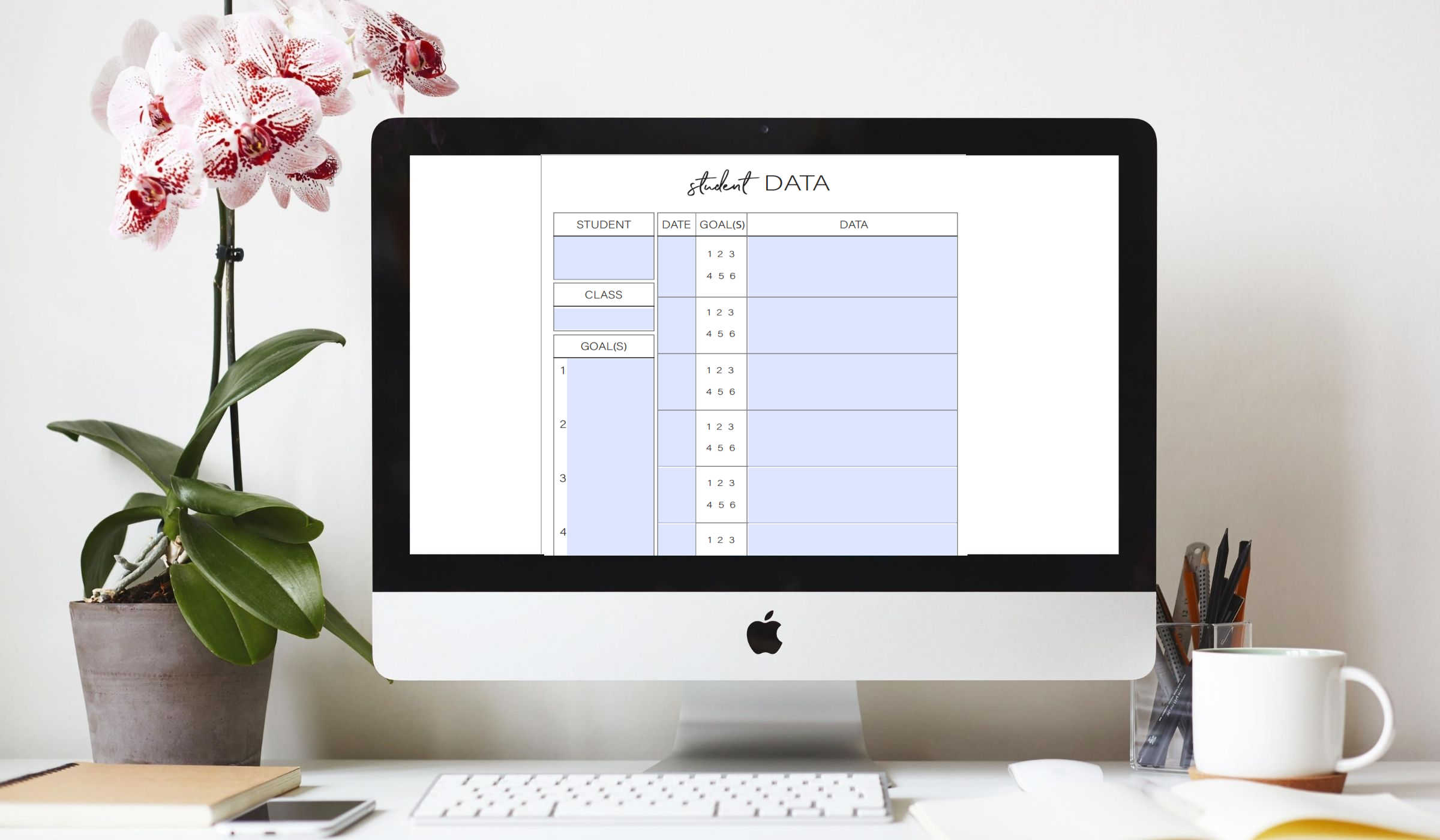
Here are all my blog posts for working on grammar skills that you might also find helpful!
33 Most Common Irregular Plurals Flashcards – Download this first post of free irregular plurals with their real-life photos.

253+ Yes or No Questions for Speech Therapy – Here is a massive resource working on answering yes or no questions.

179+ Wh Questions Free Printable – Grab this freebie to work on answering wh-questions.

197+ Best Wh Questions Speech Therapy Activities – If you have a child or student working on wh-question you’ll also want to check out this list of helpful free resources.
31+ What Questions for Speech Therapy – Have your child or student watch these wordless videos and then answer the “what” question using the interactive quiz with instant feedback.

31 Best Wordless Videos to Work on Answering Questions – Have your student watch these fun animated wordless videos and then answer the included wh-questions.

Nature Themed Bundle – This bundle includes yes/no questions, wh-questions, pronouns, regular past tense verbs, and irregular past tense verbs.
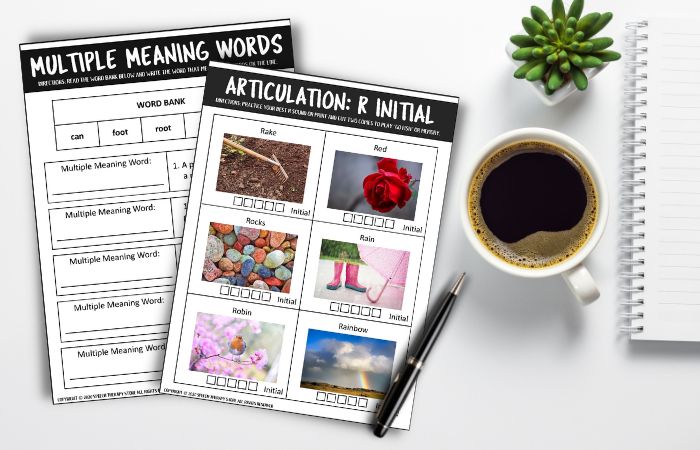
Technology Themed Bundle – This bundle also includes yes/no questions, wh-questions, pronouns, regular past tense verbs, and irregular past tense verbs.

Do you have students working on other goal areas or language skills? If so, you might want to check out my other goal banks. Here are a few of the goals you would find in my massive 432 iep goal bank:
I’ve gone ahead and gathered a few activities that you can use in your therapy room for working on your child or student’s grammar speech therapy goals.
A great first step would be to complete a formal or informal assessment to find the student’s ability level.
Language Baseline Data Tracking – Grab my baseline data tracking from my tpt store that covers regular/irregular past tense verbs, regular/irregular plurals, yes/no questions, wh-questions, pronouns, copulas, superlatives, plus even more!
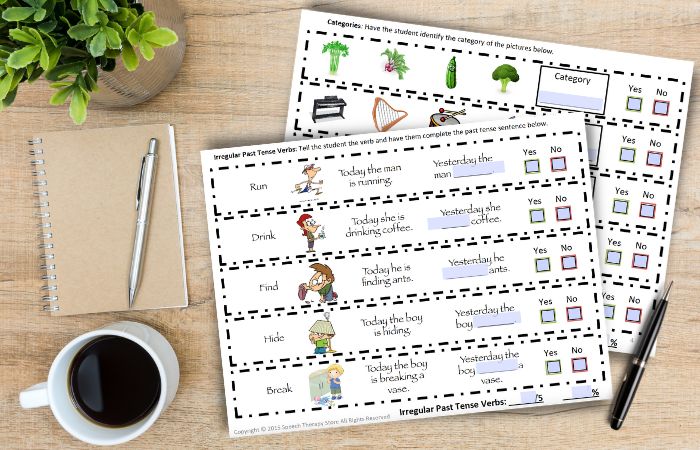
Free Informal Screener: 14 Early Developing Morphemes by Teach Speech 365 – includes a quick informal assessment of the 14 early developing grammatical morphemes.
Here are a few different language tasks that speech pathologists can use to work on a specific skill, such as irregular plurals or a prepositional phrase task.
Have your students use their appropriate grammar skills to correct the sentences in the following activities.
Here are a few grammar language intervention lessons for older students in the school setting.
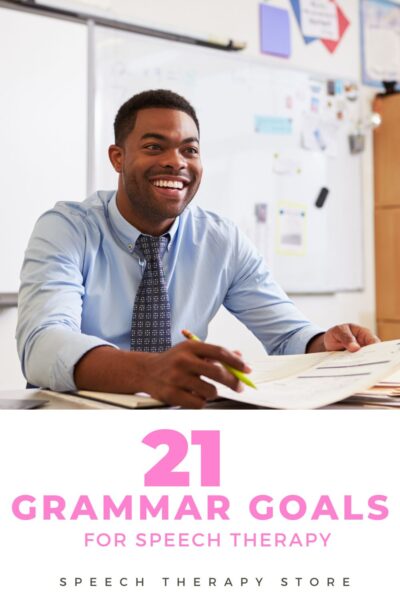
If you’re working with young children and have less time to therapy plan here are a few resources you might find helpful.
Here are some short stories that you can use to work on your child’s grammar skills within a structured activity.
Grab these graphic organizers to provide your child or students with visual prompts when working on their grammar skills.
I hope you found this list of grammar goals for speech therapy to be helpful along with the resources!
Be sure to check out our most popular posts below!
